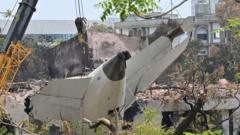The cockpit voice recorder (CVR) from the recently crashed Air India flight has been recovered, aiding ongoing investigations led by India's Aircraft Accident Investigation Bureau. With support from U.S. and U.K. teams, experts aim to understand the circumstances surrounding the incident while families await identification of their loved ones.
Investigators Recover Cockpit Voice Recorder from Air India Crash Site

Investigators Recover Cockpit Voice Recorder from Air India Crash Site
Key evidence has been discovered in the aftermath of the Air India plane crash that killed 270 people, as investigators focus on determining the cause of the tragedy.
Investigators have made a significant advancement in the inquiry into the Air India flight crash that occurred last Thursday by recovering the cockpit voice recorder (CVR). This device is crucial for revealing what transpired during the fateful moments after take-off from Ahmedabad, as it records cockpit conversations, alarms, and ambient sounds.
The ill-fated Air India Boeing 787-8 Dreamliner was bound for London when it went down just seconds after leaving the runway, claiming at least 270 lives, predominantly among those onboard. The recovery of the flight data recorder (FDR), which contains vital flight parameters like altitude and speed, had already been completed the previous day. Together, the CVR and FDR constitute the aircraft's "black box," essential for analyzing air disasters.
Although termed a "black box," these devices are bright orange and designed to withstand the impact of a crash, making them easier to locate. The investigation is being led by India’s Aircraft Accident Investigation Bureau (AAIB) with the assistance of U.S. and U.K. investigation teams, including officials from the U.S. National Transportation Safety Board (NTSB).
In response to the tragedy, the Indian government has formed a high-level committee to evaluate the crash, which will develop new standard operating procedures aimed at preventing similar incidents in the future. A preliminary report from this committee is anticipated within three months.
As the investigation proceeds, the emotional toll on families remains profound. Many are still grappling with grief and uncertainty regarding the identification of victims. Reports indicate that nearly 270 bodies have been found, with over 90 individuals identified through DNA matching, yet the process has proven slow due to the condition of the remains. Families are anxiously waiting outside hospitals for news, with some voicing their frustration over delays in the identification process.
Amidst these heart-wrenching circumstances, the recovery process for victims continues, while one notable identified victim is Vijay Rupani, former chief minister of Gujarat, who will be honored with a state funeral. For countless families, however, the anguish lingers as they await closure regarding their loved ones.



















